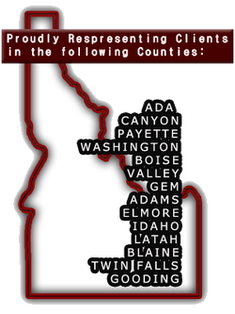|
Nona Law has been nominated for 2023 Best Defense Law firm. We would appreciate it if you would click on the link below and vote for us.
CLICK HERE
0 Comments
PRETRIAL RELEASE / SERVICES FACTS
What is Pretrial Services? Pretrial Services is a supervision and monitoring program ordered by a Judge as a condition of bond or release for someone who has been charged with a crime but hasn't been to trial. How long are people on the program? Until the criminal case is resolved and the Defendant is sentenced. Why are some people charged with crimes put on pretrial programs? This is a decision made by the Judge in charge of the criminal case who takes a variety of factors into consideration - like terms of employment, family responsibilities, where the defendant lives and student status - when determining the best interest of the person who has been charged. How can people be released from the program? When the Judge who has the case decides they can be released. What monitoring programs are available? The Judge or Pretrial Services Unit officials determine what specific programs will be used for people in the program. For the monitoring of alcohol consumption, a portable breath testing device or an ankle monitor may be used. Random urinalysis (UA) can be done for both alcohol and/or drug consumption. A Global Positioning System (OPS) monitoring unit may be used to make sure people do not violate terms of pretrial release if they have restrictions on where they are allowed to go. Options available may vary from county to county. Who chooses the monitoring program people in the program will be on? The Judge may select a specific program or ask the Pretrial Services Unit to assess and select the program which is the best fit for each person in the program. What are the fees associated with a Pretrial Program? There is no cost for the direct supervision. However, there are costs for the monitoring programs. Costs vary depending on the type of monitoring device/option you are put on. When does a Pretrial Program officially start? It starts as soon as a Judge signs the Pretrial Release Order. When scheduling Pretrial Orientation, the person in the program will be given specific instructions and expectations for each component of the program. What if people are non-compliant on the Pretrial Release Program? The Pretrial Services Unit will immediately report misconduct (violations of Pretrial release) to the Court and the Judge in charge of the criminal case. This typically results in a sanction ordered by the Judge, whether it is an immediate return to jail, the issuance of a warrant for contempt of court or an increase in bond. Why are some people placed on the Pretrial Release program before being found guilty? This is a court-ordered progran1 where the Judge has found it necessary for some people to participate. The reasoning varies, but the most common reason is to monitor for alcohol or drug use. What is the purpose of a Pretrial Release Program? To enhance community safety, reduce failure to appear wan-ants, and save taxpayer money by freeing a jail bed which could have otherwise been taken by a non-violent defendant. The long-term goal of the program is to reduce recidivism in the community. The offense of driving under the influence, or DUI, typically relates to alcohol, but alcohol is just one of many substances that can impair one's ability to operate a motor vehicle. Driving under the influence of drugs, including prescription medications, as well as illegal drugs such as marijuana, cocaine, or heroin --can also result in DUI charges. Operating a motor vehicle while under the influence of drugs, whether it's an illegal substance or legally prescribed medication, can also result in a DUI charge. Prescriptions are no defense to DUI charges. Different drugs affect drivers in different ways. Those that impair judgment, alertness, and concentration or motor skills can be as dangerous as alcohol. Since the Breathalyzer test cannot detect drugs in a person’s system like alcohol, some jurisdictions use what are called "Drug Recognition Experts" (DREs) –which are specially trained police officers who follow specific guidelines to determine drug impairment in motorists. DRE’s closely examine a person's eye movements, behavior and other cues pointing to drug influence. The presence of drugs typically is measured through urinalysis or a blood sample. Many drugs legally purchased at a pharmacy, whether they're prescribed by a doctor or bought over-the-counter (OTC) can be just as dangerous for a person driving as alcohol and can result in a DUI. Look for warning labels or ask your pharmacist if you are not sure about a drug's capacity for impairment. Below are some common prescription and OTC drugs that can impair a person’s ability to operate a motor vehicle and could result in a DUI charge: • Antidepressants: Some sedating antidepressants cause impairment similar to drunk driving. • Valium: can cause impairment similar to having a blood-alcohol concentration of 0.10 percent. • Antihistamines: Many of them slow reaction time and impair coordination. • Decongestants: Many over-the-counter decongestants can cause drowsiness, anxiety and dizziness. • Sleeping Pills: Even in the morning, the residual effects of these drugs can impair drivers. • Hydrocodone: This common pain reliever, the main component of Vicodin, is similar to opiates and causes impairment similar to morphine and codeine (oxycodone has similar effects). While DUI charges involving alcohol are more straight forward because of the BAC , it gets trickier when other substances are involved. Since the level of impairment at any given time is difficult for officers to assess, a skilled attorney can often provide an effective defense to such charges. If you have been charged with driving under the influence of drugs, you should hire a skilled attorney to represent you. The Law office of Jeffery E. Nona is here to help you! 208-331-1633. For an explanation of DUI (I.C. 18-8004) you can read more on the Idaho Statute here: https://legislature.idaho.gov/statutesrules/idstat/Title18/T18CH80/SECT18-8004/ Not so dope: Police test first marijuana breathalyzer on Cali drivers
Police in the US have gotten their hands on a marijuana breathalyzer and drivers in California were among the first to be tested –with nationwide distribution planned for next year. TrendsViral As part of an initial field test, several erratic drivers were pulled over and asked to voluntarily blow into the breathalyzer. Two of the drivers who took part in the test admitted to smoking marijuana in the previous 30 minutes, and delivered a positive reading on the handheld device. Other drivers who confessed to smoking pot within the previous two to three hours also tested positive – none of whom were arrested, although those who tested positive were not allowed to continue driving. READ MORE: California to vote on legalization of recreational marijuana after 600k signatures gathered “Basically everyone agreed because they were curious,” said Mike Lynn, CEO of Hound Labs, the Oakland-based company who developed the device with some help from the University of California’s chemistry department. Lynn, who also works as an emergency room doctor in Oakland, California, and a reserve officer with the Alameda County Sheriff’s Office, tagged along with officers to assist in the pullovers and testing. Read More: https://www.rt.com/usa/359242-marijuana-breathalyzer-california-police/ Did you know that a drug conviction can affect your eligibility for federal financial aid? the following is from Boise State.
The below information is provided to all students upon enrollment to ensure that students are aware that drug-related convictions may result in the loss of financial aid. If you're convicted of any offense under any federal or state law involving the possession or sale of a controlled substance while receiving federal financial aid you will be ineligible to receive financial aid for the following period of time: First offense, possession of a controlled substance = one year from the date of conviction. Second offense, possession of a controlled substance = two years from the date of conviction. Third offense, possession of a controlled substance = indefinitely from the date of conviction. First offense, sale of a controlled substance = two years from the date of conviction. Second offense, sale of a controlled substance = indefinitely from the date of conviction. It's possible to regain eligibility for federal financial aid before the end of your suspension period if: You satisfactorily complete an approved drug rehabilitation program that includes two unannounced drug tests. Your conviction is reversed, set aside, or otherwise rendered void. Contact Us today
Thank you to Expertise for the recognition!
Make No Statement to the Police under Any Circumstances
You may receive a call from a police officer or a detective asking you to meet with them because he wants to talk to you about a complaint that was made against you or a crime that they are investigating or something to that effect. The detective or police officer may tell you that you are not a suspect, and that he just wants to talk. You are not under any obligation to speak with them. You make ask the detective or law enforcement officer if you should speak to a lawyer or bring a lawyer with you. The officer will probably respond with something along the lines of, “Why speak to a lawyer? Are you guilty of something?” You will likely believe that if you go and speak to the police you will avoid arrest. This is not the case; in fact it is just the opposite. What You Should Do Do not speak with anyone. Write down the detective’s phone number, call your attorney and have your attorney speak to the detective or, give the detective your attorney’s phone number and have him call your attorney. If the detective wants to arrest you, then your attorney will schedule your surrender. If the detective wants to arrest you but does not have enough evidence to make an arrest, and your attorney speaks to him, you will not be arrested. If you go to the station or meet with the detectives, any statement you make WILL be used against you and you could be arrested. There is no way that going to speak with them will be beneficial, whether you are guilty of a crime or not. Why You Should Not Go to the Station or Meet With Detectives The main reason not to go to the station or meet with detectives is that there is no way it can help you. If the detective’s intention is to arrest you, you will not be able to talk him out of doing so. Whatever you tell the detective can only be used against you and will be. If you are contacted by police or detectives you should contact an attorney before speaking with anyone. Remember you are not required to speak with them and doing so may incriminate you. You are not violating any law by refusing to answer questions or speak with them about an investigation. If you called them because of an emergency, yes. But if they are investigating a crime and you are the suspect, no. First, you have the right to be left alone by police and they can't force you to talk to them. You are not violating any law by refusing to answer questions or speak with them about an investigation. Second, giving a statement creates opportunities for the police to misunderstand. Often, they have already decided you are guilty and nothing you can say will help you, in fact, it can be used against you and most often is. It is not up to the police officer to decide if charges will be filed against you. It is the officer’s job to gather information and turn it over to the prosecutor who then determines if there is enough evidence to bring charges against you. Therefore, speaking with the police only provides them with more information to turn over to the prosecuting attorney. Why take the risk?
If you are contacted by police or an investigator who wants to speak to you about a crime in which you are a suspect, call an attorney before speaking to anyone. What is Pretrial Services?
Pretrial Services is a supervision and monitoring program ordered by a judge as a condition of bond or release for someone who has been charged with a crime but hasn't been to trial. How long are people on the program? Until the criminal case is resolved. The average length of time a person is on the program is just over three months. Why are some people charged with crimes put on pretrial programs? This is a decision made by the judge in charge of the criminal case who takes a wide variety of factors into consideration — like terms of employment, family responsibilities, and student status — when determining the best interest of the person who has been charged. How can people be released from the program? When the judge who has the case decides they can be released. What monitoring programs are available? The judge or Pretrial Services Unit officials determine what specific programs will be used for people in the program. For the monitoring of alcohol consumption, a portable breath testing device or an ankle monitor may be used. Random urinalysis (UA) can be done for both alcohol and/or drug consumption. A Global Positioning System (GPS) monitoring unit may be used to make sure people do not violate terms of pretrial release if they have restrictions on where they are allowed to go. Day reporting is another option. Who chooses the alcohol monitoring program people in the program will be on? The Judge may select a specific program or ask the Pretrial Services Unit to assess and select the program which is the best fit for each person in the program. What are the fees associated with a Pretrial Program? There is no cost for the direct supervision. There are costs for monitoring programs; the portable breath testing device is $7.50/day, ankle monitor is $9.50/day, GPS is $8.00/day, and urinalysis $12.50/test. Those prices are subject to change. When does a Pretrial Program officially start? It starts as soon as a judge signs the Pretrial Release Order. When scheduling Pretrial Orientation, the person in the program will be given specific instructions and expectations for each component of the program . What if people are non-compliant during a Pretrial program? The Pretrial Services Unit will immediately report misconduct to the 4th District Court and the judge in charge of the criminal case. This typically results in a sanction ordered by the judge, whether it be an immediate return to jail, the issuance of a warrant for contempt of court or an increase in bond. Will other people drinking alcohol next to someone with an alcohol detection device set that device off? Although these devices are quite sensitive, personal contact with one another will not affect the device. Why are some people placed on pretrial program before being found guilty? This is a court-ordered program where the Judge has found it necessary for some people to participate. The reasoning varies, but the most common reason is to monitor for alcohol or drug use. What is the purpose of a Pretrial Program? To enhance community safety, reduce failure to appear warrants, and save tax payer money by freeing a jail bed which could have otherwise been taken by a non-violent defendant. The long term goal of the program is to reduce recidivism in our community. NO CONTACT ORDER
A No Contact Order can only be imposed as part of a criminal case. The Judge may issue a No Contact Order in a pending criminal case, or as part of any sentence imposed in a criminal case. Offenders who are arrested for any felony charge, or a misdemeanor charge of domestic violence, stalking, violation of a No Contact Order, or violation of a Protection Order, will appear before a Judge the next business day. The Judge, at that time, will arraign the offender, set a bond, and decide whether to impose a No Contact Order. The terms of a No Contact Order vary depending upon the Judge’s order. You should not attempt to contact the protected parties listed in the No Contact Order when there is a No Contact Order in place unless there is a specific provision in the order that allows contact by some means. Again, the terms of a No Contact Order vary from case to case and are at the discretion of the Judge. A violation of a No Contact Order is a crime and will result in new charges being filed. MODIFYING THE NO CONTACT ORDER Only the Judge can modify a No Contact Order. Either party listed in the No Contact Order may request that the Judge modify the No Contact Order. In order to have the No Contact Order modified, a Motion to Modify the No Contact Order must be filed. The Court will set a hearing on the Motion. At the hearing, the Judge may ask questions about lifting or modifying the No Contact Order. After hearing from the victim(s), the State, and the defense, the Judge will make a decision regarding the No Contact Order. |
Archives
February 2023
AuthorDevon Wilson, Marketing, PR Categories |
|
Boise Law Firm - Local Map listing
|

Jeff Nona Attorney at Law - Serving The following Counties in Idaho
Ada County Canyon County Payette County Washington County Boise County Valley County Gem County Adams County Elmore County Idaho County Latah County Blaine County Twin Falls County Gooding County |
READ ABOUT US:
legaldirectorate.com/company/jeffery-e-nona-2083311633-boise/
https://threebestrated.com/dwi-lawyers/jeffery-enona---jeff-nona-attorney-at-law-boise-city-130909058
READ ARTICLES ON OUR BLOG
legaldirectorate.com/company/jeffery-e-nona-2083311633-boise/
https://threebestrated.com/dwi-lawyers/jeffery-enona---jeff-nona-attorney-at-law-boise-city-130909058
READ ARTICLES ON OUR BLOG
If you need help, call Jeffery E. Nona, Attorney At Law today at 208-331-1633 to schedule your free initial consultation.
***The information on this website is for general information purposes only. Nothing on this site should be taken as legal advice for any is not intended to create, and receipt or viewing does not constitute, an attorney-client relationship.
Contact Us | Resources | Terms Of Use | Privacy Policy | Linking Policy | Jeff Nona Attorney at Law - All Rights Reserved

 RSS Feed
RSS Feed

